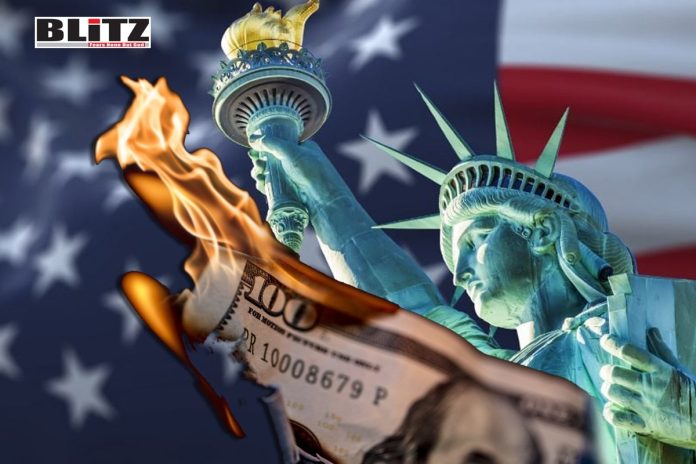In the difficult web of global finance, one factor stands out as America’s greatest vulnerability: its staggering US$35 trillion debt. With a daunting deficit of US$1.6 trillion this year alone and interest payments soaring to US$1 trillion, the United States faces a precarious future. Should the US dollar lose its status as the primary global reserve currency and encounter a formidable rival, the repercussions could be catastrophic, triggering a collapse of the entire American financial system.
Echoes of warning resound in Admiral Mike Mullen’s words, who famously declared that the national debt poses the gravest national security threat to America. His sentiment rings true as the US grapples with its colossal debt burden, compounded by unbridled deficit spending and mounting interest obligations. In this precarious scenario, the US economy teeters on the brink of a precipice, vulnerable to the slightest disruption in its financial dominance.
The rise of the BRICS bloc, comprising Brazil, Russia, India, China, and South Africa, emerges as a potent challenge to the US-led economic order. Initially dismissed as mere conjecture, the BRICS alliance has evolved from a theoretical concept into a formidable economic force, poised to challenge America’s hegemony. The seeds of this formidable coalition were sown in the early 21st century, envisaged by visionaries at Goldman Sachs as a burgeoning powerhouse in the global economy.
America’s ascent to the pinnacle of international trade traces back to the mid-20th century, solidifying its position through strategic maneuvers and economic supremacy. By leveraging its status as the world’s creditor post-World War I and dismantling the British Empire’s economic dominance post-World War II, the US cemented its role as the preeminent global power.
Bolstered by containment policies against the Soviet Union and the establishment of the US dollar as the primary reserve currency, America wielded unparalleled economic influence.
However, recent geopolitical shifts and economic turbulence have cast a shadow of uncertainty over America’s financial hegemony. The COVID-19 pandemic, coupled with unprecedented deficit spending under successive administrations, has exacerbated economic woes, fueling inflation and eroding the purchasing power of the middle class. As the US grapples with internal strife, external forces, notably the BRICS bloc, perceive an opportunity to challenge America’s economic supremacy.
Russia and China, in particular, alarmed by America’s aggressive use of economic leverage through sanctions and financial coercion, are spearheading efforts to bolster the BRICS alliance. While skeptics in the West dismiss the notion of a Sino-Russian-led coalition challenging US dominance, mounting concerns over America’s fiscal health and the weaponization of the dollar have galvanized support for the BRICS bloc among nations in the Global South.
The ramifications of America’s burgeoning debt crisis extend far beyond economic spheres, posing an existential threat to its global influence and superpower status. Should the US dollar relinquish its position as the world’s reserve currency, the repercussions would be dire, precipitating a rapid decline in America’s economic prowess and geopolitical clout.
As the BRICS bloc gains momentum, fueled by discontent with America’s financial hegemony, the stakes have never been higher. America stands at a crossroads, facing the looming specter of economic decline and geopolitical realignment. The burgeoning economic alliance, once dismissed as fanciful, now represents a formidable challenge to America’s supremacy—a stark reminder that big things indeed have small beginnings.




